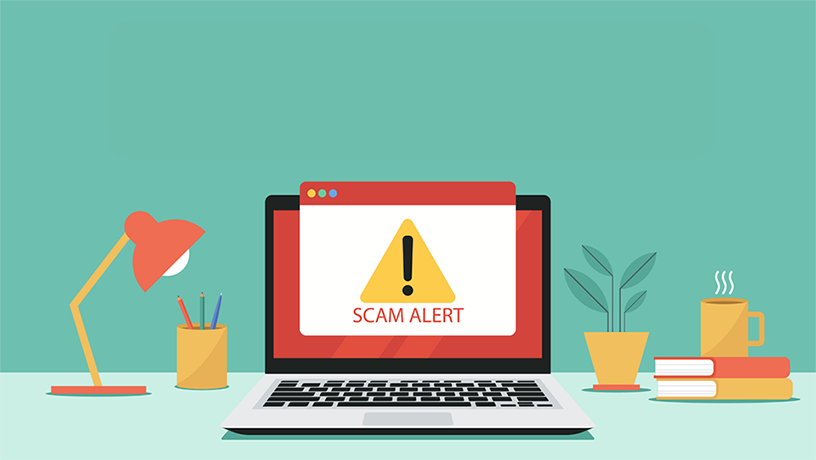Scams come in many forms and thieves are getting increasingly savvy about disguising their efforts to steal your money and personal information. That said—whether it is a phishing scam, romance scam, contractor fraud, or another scheme—most financial scams share some common red flags. To protect yourself and your financial well-being, watch for these telltale signs of nefarious behavior.
1. Problem
Scammers often use scare tactics to get your attention. Be wary of messages that claim there is a big problem you need to fix. If someone claims you owe money on back taxes, have unresolved debts, have an outstanding warrant, are the victim of fraud, or are at risk of being hurt, proceed with caution. In most cases, the scammers will offer solutions, but only if you submit personal information or provide payment.
2. Phony Website
A popular way for fraudsters to trick victims into giving up valuable personal information is through phony websites. This practice is commonly known as spoofing. Cybercriminals impersonate a legitimate organization (like Maps, Bank of America, or PayPal) with a fake website that looks convincingly like a trusted company. To spot fakes, check the domain name carefully and look for spelling and grammar errors. Watch out for spoofed domain names combined with legitimate-looking URLs (e.g., Paypal.com.secure-site.com). Look for a padlock symbol before the URL (but don’t trust that as the only source of verification). You can also use a website checker (like Google Transparency Report) to see if the site uses encryption to protect your data.
3. Poor Spelling and Grammar
Phishing emails and websites are often riddled with mistakes—and it’s not just because the scammers are sloppy. While many of these errors can be explained by carelessness or a language barrier, some fraudsters intentionally inject tiny mistakes into their messages to weed out consumers who are too clever to be duped.
4. Personal Information
A request for personal information is a big red flag. If someone calls, texts, emails, or approaches you asking for your personal information—especially if it is a person or company unfamiliar to you—do not give it to them. According to the U.S. Department of Labor, “personal identifiable information” includes anything that would allow someone to figure out who you are. That includes your name, address, social security number, telephone number, email address, or other such information. Be aware that reputable companies, agencies, and institutions like Maps will not call you and ask for this information. If you think you are interacting with a reputable company and they ask for personal information, end the interaction and initiate a call back to verify you are talking to the right people.
5. Pressure
Scammers want you to act before your rational brain kicks in, so it’s common for them to pressure you into acting fast. They may threaten legal action or tell you your utilities are about to be turned off—anything to get you to relinquish money before you think about what you are doing. They also want to avoid giving you the time or opportunity to verify their story. If anyone tells you that you need to act immediately, consider it a warning sign.
6. Pay
If someone you don’t know asks you to send money to them, it should be a red flag—especially if they ask you to pay via unconventional methods like gift cards, wire transfers, or cryptocurrency. If you are told you owe money, verify the debt. If you are paying for a product or service, double check that what you are getting is legitimate. If you are paying for an event (like a concert or sporting event) don’t pay until you have the tickets in your hand.
7. Prize
In this digital age, it’s wise to remember the popular adage “if it seems too good to be true, it probably is”. In fact, sweepstakes, prize, and lottery frauds are so common that the FTC reports they are among the top reported scams. If you get a message that claims “You’ve won!”, don’t fill out their online forms, click on their links, or submit your personal information. More importantly, do not pay to collect the prize. Legitimate prizes are typically free. Anyone who asks you to pay a fee for “shipping and handling,” “taxes,” or “processing fees” to get a prize, is a scammer.
8. Perplexing
If something feels off about an interaction, trust your instincts. Legitimate companies, financial institutions, or government agencies should have no problem with you ending a call, verifying information, or clarifying the meaning of something before you give your personal information or make a payment. If you are confused, ask for clarification. If you are suspicious, hang up and call the person back using their publicized customer service line (not a number the caller gives you). If a website or email seems questionable, do not open it and do not click on the links.
Awareness is the key to avoiding scams, so keep yourself informed and be on the lookout for suspicious signs. If you believe you have already been the victim of a scam, contact us immediately at 503.588.0181 and consider reporting it to the Federal Trade Commission, your state consumer protection office, and the local authorities.

